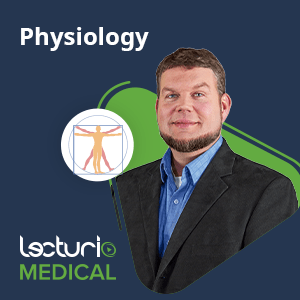Physiology can seem intimidating. Unlike anatomy, there’s a lot of understanding involved, and if you don’t understand the basics, you’ll have a hard time. This is a subject where you do not want to get left behind. Getting lost in the barrage of lectures is common among students. To make things harder to learn, each body system has its own physiology, and they’re all interconnected.
Sounds scary? It is — but it doesn’t have to be. This article will help teach you how to navigate the complicated processes of our bodies. I listed tips that helped me and will, hopefully, help you on your journey. Before you jump into the full online physiology course, let’s define physiology.
What is Physiology?
Physiology is the study of the normal functions of living things. Basically, it’s how your body works.
Most of the time, bodily processes work toward homeostasis. Your body will always try to keep itself in balance to stay alive. That’s why physiology is so closely related to pathology. Physiology is about normal functions and keeping the body in balance. Pathophysiology is about when these processes go wrong.
So why is it so necessary to learn for future doctors? Physiology is the foundation of medicine.
Doctors are meant to diagnose patients with various pathologies. This would be impossible to do without knowing what’s normal first! Also, you’ll be explaining these concepts to patients and relating them to their treatments. For example, if you don’t know how negative feedback processes work in endocrine glands, correcting deranged hormones in your patients will be tough.
Take the Course: Physiology
Deep-dive into physiology with Dr. Thad Wilson – come on in, the water’s fine!
What Makes Physiology So Hard?
Our bodies are complex structures. They’re a conglomeration of different tissues working together, even at the cellular level. In other words, you’ll learn concepts that you can’t directly observe. You don’t see how molecules pass through a cellular membrane. You can’t feel how a kidney filters the different molecules that pass through it. It’s hard to learn something you can’t see, hear, or feel.
To make the subject more complicated, it involves a mixture of math, chemistry, physics, and other basic sciences. So if you dislike any of those subjects, you should start accepting that they’re coming back — with a vengeance. This was particularly frustrating for me. I went to medical school because I was told there would be virtually no math involved. Suddenly, I had to compute things like the Hagen–Poiseuille equation.
Physiology is usually taught one body system at a time. Sure, these processes are all interconnected, but there are way too many subjects. You’ll get overwhelmed if you don’t take it in chunks. So, at the end of the day, it’s up to you to piece these concepts together. Unfortunately, because of this, If you don’t understand one body system, these pieces won’t fit together.
Physiology and Anatomy
These subjects are usually taught together. Why? Because they’re closely related. You can’t study one without the other.
You can try to learn them separately, but that’ll only confuse you. You’ll find yourself lost in a maze of terms and processes that don’t make sense.
So, I suggest that when you learn physiology, you have a quick reference for anatomy open. It is said that “form follows function.” This is totally true in learning both subjects. The structure of the human body plays a role in how it works. For example, when your brain is injured, it’ll manifest various symptoms, depending on the location.
Think about it this way: “Anatomy is to physiology as geography is to history; it describes the theater of events.” This was said by Jean François Fernel, the doctor who termed the word, physiology. So make sure you have a firm grasp of anatomy as you go through physiology. That way, your approach to physiology will be like reading a story with a setting you’re already familiar with.
Tips for studying physiology
Physiology is not easy. Personally, I found it was one of the toughest because it encompassed almost everything in medicine.
It even comes up in your future subjects again and again. Because of that, it’s overwhelming. You can easily get lost if you can’t follow your lectures.
#1: Try to understand before moving on
As I said, it’s easy to get lost in Physiology. If you don’t understand its basic concepts, it will be worse when you try to learn the advanced ones.
For example, I had trouble understanding cell membrane diffusion and transporters. Because of that, I had a hard time learning about kidney physiology. I would feel lost trying to keep up with classes. Eventually, I just gave up listening to my lectures because I couldn’t understand them at all.
To avoid this, when you get to review on your own, start from the beginning or from the part you find the hardest. What matters is that you backtrack to a subject you can’t understand, no matter how basic. Also, if you can, try to read up on your subjects beforehand so that you know your weak points.
#2: Draw!
I almost always say that drawing is a great learning tool.
In physiology, there are many diagrams you need to learn from. Sure, you can try to learn processes through reading a wall of words. However, using visual representation organizes your thoughts.
There are various ways to draw what you learn in physiology. You can have drawings, mind maps, flowcharts, and different types of diagrams. It’s even better if you draw it yourself from memory. Make sure to post them around your study area. Sometimes I even used diagrams as my phone wallpaper. As long as you place these visuals somewhere you often look, it’ll be easier to remember them.
#3: Watch videos
Sometimes it’s hard to understand physiological processes through diagrams or words alone. Instead, try watching these processes in action. Videos are the best way to see physiology in motion. I used to find myself completely lost and glazing over words in my book because I couldn’t grasp the concepts being explained.
There are several resources you can use. YouTube has a lot of animations you can watch on different topics, like the coagulation cascade. You can even find gifs on websites for visual representations of difficult concepts, like the cardiac cycle. I don’t think I could have learned that topic without relating it to an animation of a heart beating.
Related videos
#4: Quiz yourself
Test-enhanced learning involves recalling facts through repeated testing. This is known to better long-term memory for students because it practices information retrieval.
Testing yourself helps you assess the topics you know well and those you still need to learn. Once you find your weaknesses, you can start prioritizing them as you go through the subject.
Luckily, Lecturio has a quiz function. I use the daily question feature to help me learn. Once you answer, there’s even feedback to explain why some choices were wrong while others were correct. The best part about quizzes is that we can make mistakes without hurting anyone. In fact, making mistakes might help you more because each mistake is an opportunity to learn. You’ll make many errors in understanding physiology. So, it’s better to be corrected in a quiz than to make errors as a doctor.
Another technique you can use is to answer practice tests with other people. I did this for my licensure exam and it was super effective! My small group of friends and I would answer practice tests together and discuss why some answers were wrong or right. If anything, I always remembered the times I was wrong better than when I was right.
#5: Have someone teach you and teach it to someone
Always be open to being both a teacher and a student when learning with a group. Medical school can feel like a lonely road, but it isn’t. There are other people on this path with you. They’re taking the same lessons, struggling with the same problems, and making the same mistakes.
So if you’re struggling with something, don’t be afraid to ask for help. Maybe there’s something you can teach in return.
Why do I highly recommend doing this? That’s because studies say that teaching makes you more engaged in the topic. Back when I would make lectures or reports for class, I would ask myself, “What could they ask me?” or “Are these points organized in a way people can understand?” Because of this, I would gain a mastery of the subject. I would explain using my own words and create visual materials that made learning more fun.
Even having a study group to discuss topics can help you retain information. You might even enjoy group discussions because you get to socialize with others. You could exchange mnemonics and jokes about your lessons, making those concepts easier to remember. Maybe you’ll even get to share your feelings about the subject, which can help you process your emotions so that you could focus on studying later on.
#6: Prioritize your best resources
We know by now that physiology is not an easy subject. Well, teaching it isn’t any easier. It’s hard to explain complex processes in the body. It’s even harder to not simplify it too much to avoid misunderstandings. Because of this — like any subject — some lectures you’ll have in physiology will be hit-and-miss.
I’m not telling you to skip class. Many lectures are high-yield, and using a lecture as an introduction to a topic can be helpful. Lectures also provide an opportunity to ask questions about concepts you find difficult. However, if you can’t follow your lectures, you can go back to the topic through other resources. You can use textbooks, notes from upperclassmen, and even online lectures. What matters is that you’re learning in the best way you can. So don’t worry too much about not understanding your lectures on physiology. There are many ways for you to catch up.
My experience in physiology
I remember having an emotional breakdown from my first few physiology classes. They were hard to follow because my undergraduate degree didn’t tackle these topics. I even had a disadvantage compared with my other classmates, who mostly came from biology and health-related classes. Eventually, I learned that I was going about things wrong. Attending lectures, taking notes, and studying them later didn’t work for me. Instead, I attended class to give me an overview of the subject. Then, I would read the book or watch online videos that I could easily understand. Finally, I would connect those lessons to my lecture notes. This took up a lot less time than trying to read lecture notes that I didn’t understand in the first place.
So, don’t worry. Most people feel the same way you do. There’s always at least one Physiology topic that students struggle to understand. But you’ll get it. With some help from friends and the right resources, physiology is just another hurdle on your way to becoming a great doctor.





